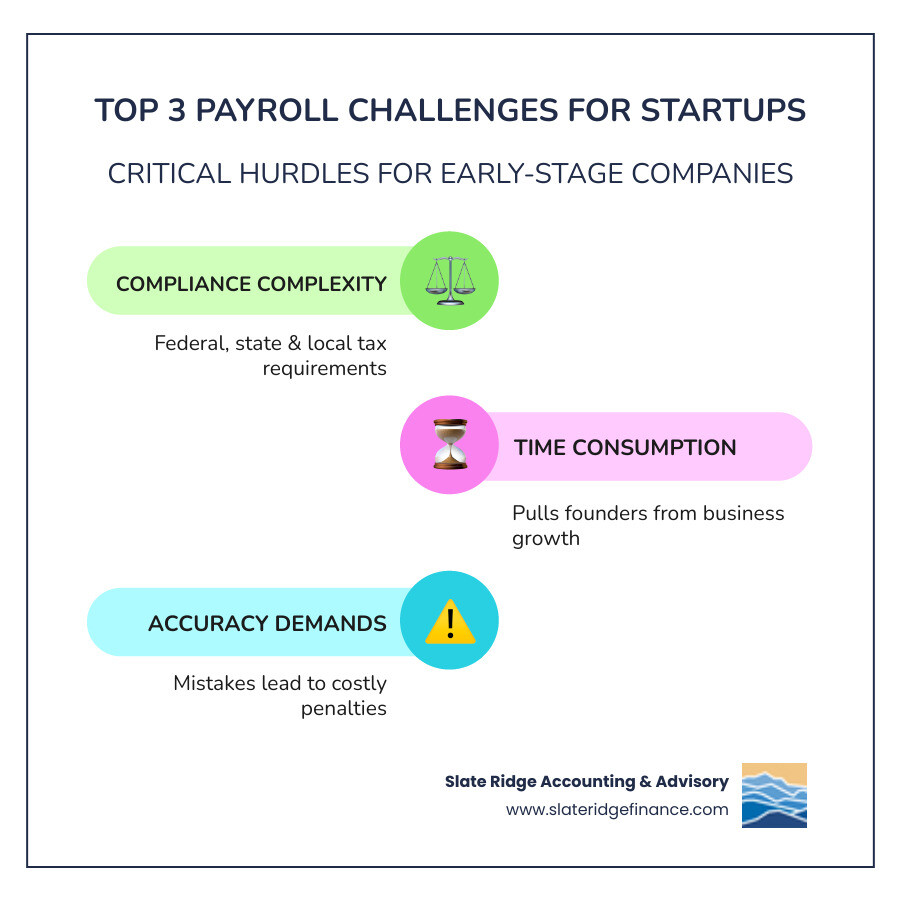Why Payroll is a Critical Hurdle for Startups
Payroll services for startups are essential tools that can make or break your early-stage business success. When you're juggling product development, fundraising, and customer acquisition, payroll might seem like just another administrative task - but it's actually one of the most critical systems you'll implement.
The stakes are higher than you might think. 98% of clients who choose professional payroll services stay with them - and there's good reason for that loyalty. Payroll mistakes can cost you far more than service fees, with penalties for missing remittance payments often exceeding yearly payroll costs.
"Payroll isn't your passion? That's OK!" as one payroll expert puts it. The reality is that 88% of customers reduce business admin when they use integrated payroll solutions instead of handling everything manually.
Here's what makes payroll particularly challenging for startups:
- Compliance complexity across federal, state, and local tax requirements
- Time consumption that pulls you away from growing your business
- Accuracy demands where small mistakes lead to big penalties
- Scaling challenges as you add employees in different states or countries
The good news? Modern payroll services have evolved specifically to address these startup pain points. Some founders report cutting their payroll processing time from a full day to under an hour each month.

Decoding Your Payroll Options: In-House vs. Software vs. Outsourcing
As a startup founder, you have three solid paths for handling payroll, each with its own trade-offs. Let's break down your options so you can pick the one that fits your startup's stage, budget, and tolerance for administrative headaches.

The DIY Approach: In-House Payroll
Some founders look at payroll services for startups and think, "I can handle this myself." The DIY route gives you complete control over every detail and keeps all your sensitive employee data in-house, ensuring total confidentiality.
But here's where things get real. Managing payroll in-house is incredibly time-intensive and requires you to become an expert in constantly changing tax laws. The manual calculations alone can eat up days each month, and the compliance risk falls squarely on your shoulders. For most startups, this approach quickly becomes unsustainable as the team grows.
The Tech-Savvy Solution: Payroll Software
Welcome to the middle ground where technology meets practicality. Payroll software automates the heavy lifting while keeping you in the driver's seat.
Automation handles wage calculations, tax withholdings, and direct deposits. Many founders also love the employee self-service features, which allow team members to access their own pay stubs and information. The integration potential with your existing accounting and time-tracking tools is a major benefit, with some users saving nearly 4 hours a week.
The trade-off? There's a learning curve, and you'll still need to provide oversight. It's cost-effective compared to full outsourcing, making it a sweet spot for many growing startups.
The Hands-Off Method: Fully Outsourced Payroll Services
This is the "let the experts handle it" approach. You hand over your payroll completely to professionals who live and breathe tax compliance.
The biggest win is expert management with a compliance guarantee. These providers stay current with changing tax laws, handle government remittances, year-end reporting, and often provide valuable HR support. Some founders report cutting their payroll processing time to just five minutes per pay period.
The higher cost is the main consideration. But when you factor in the time savings and peace of mind, many startups find it's worth every penny so they can focus entirely on building their company.
For businesses ready to streamline their operations with professional support, you might want to explore more info about our Professional Services.
The right choice depends on your current stage, budget, and how much you enjoy diving into tax regulations. Most founders would rather focus on their actual business.
Key Features to Look for in Payroll Services for Startups
When searching for the perfect payroll services for startups, you need a solution that is reliable and robust. The right service should feel like a trusted teammate, handling complex tasks so you can focus on growth.

Core Payroll & Tax Compliance
The foundation of any good payroll service is rock-solid basics. Automated calculations for gross pay, deductions, and benefits are non-negotiable. Direct deposit is also a must-have for modern employees.
Most importantly, the service must handle tax compliance by automatically calculating, withholding, and remitting federal, state, and local taxes. The best services offer tax penalty protection, which is critical since penalties can exceed the yearly service cost. Automatic W-2 and 1099 generation at year-end is another key feature that saves significant time and stress. For more details, you can see tax information for businesses from the IRS.
Scalability and Growth Potential
Your payroll service needs to grow with you. Multi-state support is crucial the moment you hire remotely. Your service should also handle various worker types, including hourly, salaried, and contractors, with flexible contractor payments and 1099 processing. Look for tiered plans that let you upgrade features as your team grows, so you don't have to switch providers during a growth spurt.
Integrations with Your Tech Stack
Your business tools should work together seamlessly. Accounting software sync is vital. Seamless integration with your accounting platform eliminates manual data entry and provides real-time financial visibility. Some users save nearly 4 hours a week with integrated systems.
Integration with time-tracking tools is a game-changer for hourly employees, as it automates timesheet data transfer and reduces errors. HR platform connections can also create a centralized hub for all employee information. To see how integrated solutions work, you can learn about our Virtual Accounting services.
Employee Experience & Self-Service
A good payroll experience contributes to job satisfaction. Employee portals should offer secure access to pay stubs, tax documents, and personal information. Mobile access is no longer a luxury but an expectation. Easy access to pay stub history and tax forms empowers employees and reduces your administrative burden. When PTO management is integrated, employees can request time off and track balances in one place, contributing to a positive and modern work culture.
A Closer Look at Specialized Payroll Solutions
Not all startups are created equal, and neither are their payroll needs. Payroll services for startups have evolved to meet these diverse needs with specialized solutions, whether you're a two-person team or a global remote-first company. Let's explore which solutions work best for different startup situations.
Best for Bootstrapped Startups: Budget-Friendly Payroll Software
When you're counting every penny, you need payroll solutions that deliver the essentials without a premium price tag. Budget-friendly payroll software focuses on core functionality with predictable, low costs.
These solutions typically feature low base fees plus a small per-employee pricing structure. You'll get must-have features like automated calculations, direct deposit, and basic tax filing. The trade-off is that these services are often self-service focused, meaning you handle most of the setup and oversight. They are designed for easy setup, providing reliable payroll processing that won't drain your startup funds.
For transparency about how professional services can fit within your budget, you can View our Pricing.
Best for Remote & Global Teams: International Payroll Support
If your startup operates across borders, you need specialized solutions to handle the complexity of international employment.
Global contractor payments are a lifeline for working with worldwide talent. The best platforms manage multi-currency support and handle payments to dozens of countries. International compliance is another major challenge, as labor laws and tax regulations vary widely. Specialized platforms often offer Employer of Record (EOR) services, acting as the legal employer in foreign countries so you can hire globally without establishing local entities. They also provide onboarding tools to simplify the process.
Best for Scaling Fast: All-in-One HR & Payroll Platforms
When your startup is growing rapidly, all-in-one HR and payroll platforms become invaluable. These solutions offer integrated HR features beyond basic payroll, such as performance reviews and centralized employee data.
Benefits administration is also crucial for competing for top talent. These platforms help you manage health insurance, 401(k) plans, and other benefits seamlessly. For a more comprehensive option, Professional Employer Organization (PEO) services co-employ your staff, taking on significant HR responsibilities. This robust solution is now accessible even for smaller startups with multi-state employees, allowing founders to focus on growth.
Avoiding Pitfalls: Common Startup Payroll Mistakes
Let's be honest - even with the best payroll services for startups, it's surprisingly easy to stumble into costly mistakes. We've watched too many founders learn these lessons the hard way, and frankly, it breaks our hearts to see preventable errors derail promising businesses.
The truth is, payroll mistakes aren't just embarrassing - they're expensive. We're talking about penalties that can exceed your entire yearly payroll service fees, not to mention the stress of dealing with unhappy employees and government agencies.
Employee misclassification tops our list of nightmare scenarios. It seems simple enough - hire someone as a contractor instead of an employee to save on taxes and benefits. But the IRS has very specific rules about who qualifies as an independent contractor. Get this wrong, and you're looking at back taxes, penalties, and potentially years of headaches.
Tax withholding errors are another common trap. Each jurisdiction - federal, state, and sometimes local - has its own requirements. Miss the mark on withholding amounts, and both you and your employees end up facing unexpected tax bills. Nobody wants that conversation during tax season.
Then there's the dreaded missed deadline. Payroll taxes aren't like your credit card bill - there's no grace period. Miss a remittance deadline, and the penalties start accumulating immediately. We've seen startups hit with fines that could have paid for several months of professional payroll services.
Poor record-keeping might seem like a minor issue until the IRS comes knocking. Disorganized payroll records can turn a routine audit into a months-long ordeal. Your future self will thank you for maintaining detailed, organized records from day one.
For hourly employees, inaccurate time tracking creates compliance nightmares around minimum wage and overtime laws. Every state has different rules, and getting creative with how you calculate hours worked is a recipe for trouble.
Speaking of state differences, ignoring state-specific regulations is where many multi-state startups stumble. What's perfectly legal in California might violate labor laws in Texas. Each new state brings new rules to master.
Don't forget the basics either. You need written consent for direct deposit - yes, even in our digital age. And those detailed pay stubs aren't optional nice-to-haves; they're legal requirements in most states.
Finally, year-end reporting catches many startups off guard. Those W-2s and 1099s don't file themselves, and the deadlines are non-negotiable.
The good news? Most of these pitfalls disappear when you choose robust payroll solutions with built-in compliance features. Think of it as buying insurance for your peace of mind - and your bank account.
Frequently Asked Questions about Startup Payroll
When you're diving into payroll services for startups, it's natural to have questions. We've been helping founders steer these waters for years, and these are the questions that come up most often in our conversations.
How often should a startup run payroll?
The simple answer? It depends on where you are and what works for your team. Most startups find their sweet spot with either bi-weekly (every two weeks) or semi-monthly (twice a month) payroll cycles.
Here's the thing - your state might actually make this decision for you. Many states have minimum pay frequency requirements, especially for hourly workers. Some require weekly payments, while others are more flexible.
Bi-weekly payroll is incredibly popular because it's predictable - same day every two weeks, 26 pay periods per year. Your employees love the consistency, and it's administratively manageable. Semi-monthly (like the 1st and 15th) gives you 24 pay periods and can align nicely with your monthly business rhythm.
Weekly payroll works great if you have a lot of hourly workers or if your state requires it. Monthly payroll is rare for employees (though common for contractors) because cash flow can be tough for your team.
The best frequency balances what your employees need, what your state requires, and what you can handle administratively. Most payroll services handle any frequency you choose, so you're not locked in by your provider.
How much do payroll services for startups cost?
Let's talk numbers - because budgeting matters when you're bootstrapping or watching every dollar.
Most payroll services for startups use a simple pricing model: a base monthly fee plus a per-employee charge. You're typically looking at $10-50 for the base fee, then $4-10 per employee each month.
So if you have 5 employees, you might pay around $35-75 per month total. As you grow to 20 employees, that could be $90-250 monthly. The exact cost depends on what features you need.
Watch out for hidden costs - some providers tack on setup fees, year-end processing charges, or extra costs for tax filing. Always ask for the full picture upfront. The best providers are transparent about their pricing.
Here's a reality check: even if you're paying $100 monthly for payroll services, that's probably less than you'd spend fixing one payroll mistake. Penalties for missing tax payments can exceed your entire yearly payroll service cost.
Many services offer tiered pricing - basic payroll at the lower end, full HR and benefits administration at the higher end. Start with what you need now, knowing you can upgrade as you grow.
What is the difference between a payroll service and a full-service HR provider?
This is where things get interesting - and where many startups get confused.
A payroll service focuses on the money side of things. They calculate wages, handle deductions, cut paychecks (or direct deposits), and file your payroll taxes. Think of them as your financial transaction specialists. They make sure everyone gets paid correctly and the government gets their cut on time.
A full-service HR provider - often called a PEO (Professional Employer Organization) - is like having an entire HR department without hiring one. Beyond payroll, they help with employee handbooks, onboarding new hires, benefits administration, workers' compensation, and compliance guidance.
Here's the key difference: with a PEO, they often become a co-employer of your staff. This means they share some of the legal responsibilities and liabilities of being an employer. It's like having a business partner who specializes in all the people-management stuff you'd rather not worry about.
The choice comes down to this: Do you just need help with the math and paperwork of paying people? Or do you want to offload the entire headache of HR management?
Many modern payroll platforms blur these lines, offering HR features as add-ons. This gives you flexibility to start simple and add services as your team grows and your needs become more complex.
Conclusion: Choosing the Right Payroll Partner for Your Future
Selecting the right payroll services for startups isn't just another item on your business setup checklist - it's a strategic decision that will impact every aspect of your company's growth journey. Think of it as choosing a financial partner who'll be there through your scrappy early days, your first major hiring spree, and beyond.
The numbers don't lie: 98% of clients who choose professional payroll services stick with them. That loyalty stems from experiencing how the right solution transforms a time-consuming, error-prone process into a seamless operation that just works.
Throughout our exploration, we've seen how different approaches serve different needs. Maybe you're bootstrapping and need every dollar to count, or perhaps you're managing a global team spread across continents. Whether you choose a budget-friendly software solution or a comprehensive outsourced service, the key is finding one that aligns with your current reality while growing with your ambitions.
Remember those common pitfalls we discussed? The right payroll partner acts as your safety net, protecting you from costly mistakes like employee misclassification or missed tax deadlines. When penalties for a single missed remittance can exceed your entire annual payroll service cost, this protection becomes invaluable.
But here's what really matters: freeing up your mental bandwidth. When you're not lying awake wondering if you calculated overtime correctly or filed the right forms, you can focus on what you do best - building your business. Some founders report cutting their payroll processing time from a full day to under an hour each month. That's time you can spend on product development, customer acquisition, or strategic planning.
The integration capabilities we've discussed aren't just nice-to-have features - they're your pathway to clear financial visibility. When your payroll syncs seamlessly with your accounting system, you gain real-time insights into your cash flow, labor costs, and growth patterns. This clarity becomes the foundation for making informed decisions about hiring, budgeting, and scaling.
At Slate Ridge Accounting & Advisory, we see this every day with our clients across North Carolina and beyond. The startups that thrive are the ones who recognize that smart financial systems - including payroll - aren't expenses but investments in their future success.
Your payroll choice today shapes your company's tomorrow. Choose a partner who understands that your two-person team might become twenty, that your single-state operation could go global, and that compliance and accuracy aren't optional.
Ready to get that clear financial picture that comes from having all your systems working in harmony? Get a clear financial picture with Virtual Accounting. Let's build the financial foundation your startup deserves.
Ready to get started?
Book a free consultation today and let’s explore how Slate Ridge can support your business with expert accounting that’s accurate, timely, and built around your goals.






